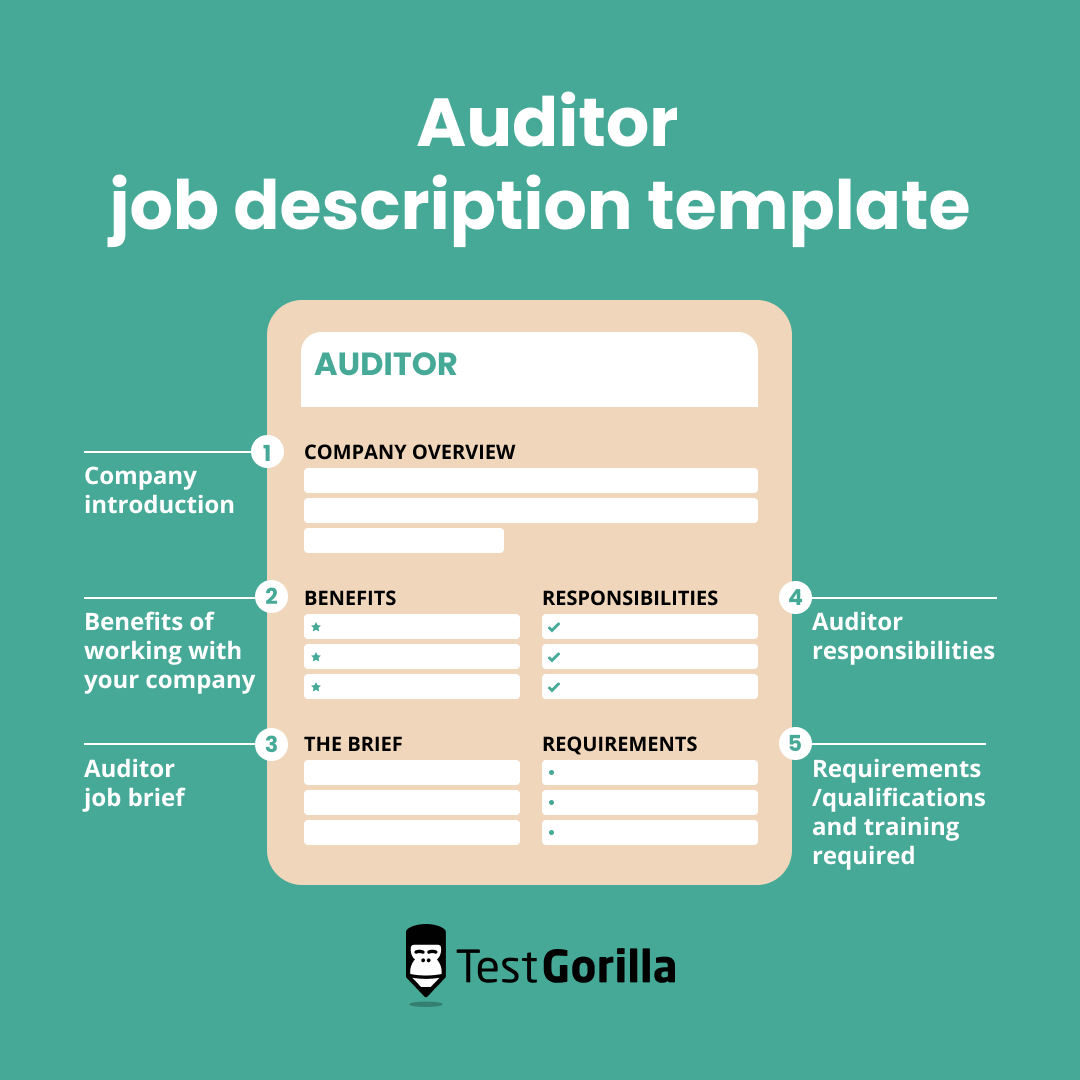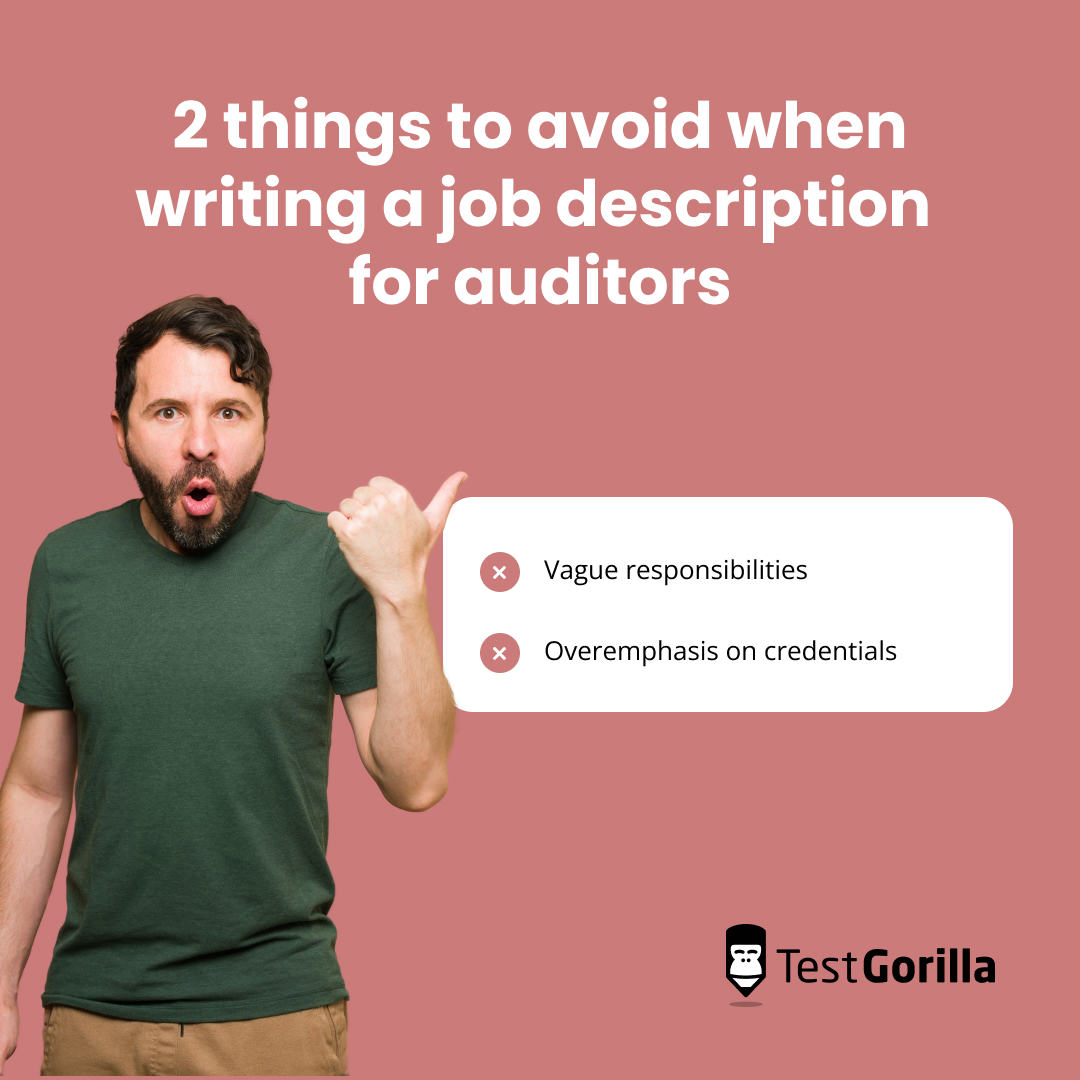Auditors are the meticulous guardians of financial accuracy, but hiring the right one is crucial. Otherwise, they could affect your organization’s fiscal health and team dynamic.
To draw in auditors with the perfect mix of technical expertise and interpersonal finesse, your job description must detail the necessary skills, tasks, and credentials required.
Fortunately, you're in good hands. In this guide, we'll walk you through crafting a precise job description for auditors, highlight the essential attributes to seek out, and share what errors to dodge. We've even thrown in a template to get your recruitment underway.
Table of contents
What is an auditor
An auditor scrutinizes a company's financial records and operational systems to confirm they are accurate and compliant with regulations. External auditors independently assess financial statements, whereas internal auditors additionally review controls and risk management to keep organizations efficient.
By examining details like cash flow accuracy and fraud prevention measures, auditors play a key role in ensuring transparency, earning stakeholder trust and contributing to the organization's financial stability.
Key skills to look for in auditors
A talented auditor should have the following mix of hard and soft skills.
Analytical skills: Navigating complex financial data to uncover discrepancies and understand fiscal patterns.
Attention to detail: Scrutinizing records meticulously to ensure accurate financial reporting.
Integrity: Upholding ethical standards and confidentiality with sensitive financial information.
Communication skills: Clearly communicating audit findings and implications to stakeholders.
Critical thinking: Evaluating financial controls and practices for efficiency and risk management.
Problem-solving skills: Finding solutions for a range of audit challenges, from internal control weaknesses to regulatory non-compliance.
Adaptability: Adjusting to new financial regulations and audit methodologies as needed.
Technical proficiency: Using accounting software like QuickBooks, SAP, and Oracle for financial tracking and Excel for complex data analysis.
Teamwork: Working with peers to conduct thorough audits and with clients to obtain and verify financial information.
The best insights on HR and recruitment, delivered to your inbox.
Biweekly updates. No spam. Unsubscribe any time.
How to write an effective auditor job description
To prepare an effective job description, precisely define the qualifications and duties required for the role. Here are some ways to kick off the process.
Highlight key responsibilities
Begin by detailing the primary responsibilities of the auditor. For example, specify if they’ll focus on internal or external audits, compliance checks, or risk assessments.
This clarity helps attract candidates who are prepared for the specific tasks they’ll handle. Also, it ensures a better fit for your organization's needs, reducing the likelihood of turnover due to mismatched expectations.
Specify required qualifications
Clearly list the necessary qualifications, such as a CPA license or a particular level of experience with industry-standard software. By being explicit about qualifications like a bachelor's degree in accounting or proficiency in data analysis tools, you filter applicants early on, saving time and resources in the hiring process.
Outline growth opportunities
Mention opportunities for professional development and career advancement within the role. For instance, if there's a clear path from junior to senior auditor, make that known. This can attract ambitious professionals who are looking to grow and are thus more likely to invest long term in your company.
Auditor job description template
Use the template below as a foundation for your job description.
Company introduction
Introduce your organization, outlining its establishment, growth trajectory, and the industries it serves. Spotlight key achievements like high-profile audits, commendations for financial stewardship, or significant compliance milestones that showcase your firm's reputation and expertise.
Benefits of working with [Your company]
This section should detail the compensation and benefits for auditors, including a competitive salary, health insurance, and vacation days. Additionally, explain non-salary perks like continuous learning and development, certification support, or remote work arrangements.
Auditor job brief
[Company name]
Role Title: [For example, Junior Auditor, Senior Auditor, Audit Manager]
Reports to: [For instance, Senior Auditor, Audit Manager, Senior Audit Director]
Position Type and Location: [Full-time, part-time, on-site, remote, or hybrid]
[Compensation details, including salary and benefits]
Job Overview: [A concise paragraph outlining the role's responsibilities, the indicators of success in the position, and how it fits into the organization]
Auditor responsibilities
Execute detailed audits of financial statements, such as balance sheets and income statements, to verify their accuracy and adherence to accounting principles.
Evaluate internal controls, checking if procedures for financial reporting and compliance are robust and effective, using specific frameworks like COSO or SOX (Sarbanes-Oxley Act).
Review and analyze the organization's risk management strategies, ensuring they’re able to protect against financial and operational risks.
Probe financial records for any signs of fraudulent activity, using forensic accounting techniques where necessary.
Ensure that the organization is complying with all financial regulatory requirements, staying updated with changes in accounting standards and laws.
Work with various departments to understand processes, gather necessary information, and provide feedback on findings.
Gather audit results into clear, concise reports for management, showing findings and providing actionable recommendations.
Communicate technical and complex financial information to stakeholders, both verbally and in writing, ensuring clarity and understanding.
Requirements/Qualifications and training required
Bachelor's degree in accounting, finance, or a related field, or equivalent professional qualification (such as CPA)
Minimum of two years of experience in auditing or a related area of finance
Demonstrated proficiency in accounting principles and a strong understanding of audit frameworks and regulations (such as GAAP, IFRS, COSO, SOX)
2 things to avoid when writing a job description for auditors
Watch out for these pitfalls when writing your auditor job description.
1. Vague responsibilities
Your auditor job description needs to be precise. Instead of saying “conduct audits,” detail the types needed—be it financial, compliance, or operational audits. Mention if they'll tackle tax complexities or scrutinize IT security. This attracts professionals with the exact expertise and experience your role demands.
A broad job description can attract many unqualified applicants, which is inefficient. Specify necessary audit specialties—financial analysis, IT auditing, or forensic skills—to ensure only qualified candidates apply. This will make your hiring process more focused and effective.
2. Overemphasis on credentials
It’s wise to balance educational requirements with the value of hands-on experience. Sure, a CPA or a master's degree in accounting is impressive, but what about the applicant with a solid track record of leading complex audits?
For instance, consider if in-depth knowledge from actual audit trenches could outweigh a fresh MBA when it comes to forensic accounting tasks. Recognizing varied paths to expertise can widen your talent pool and bring in seasoned pros who can hit the ground running.
Next steps: Attracting and assessing auditor candidates
Now that you've made a detailed auditor job description it's time to share it on leading job boards such as LinkedIn and Indeed. But don’t limit yourself to those platforms. Post it on company social media accounts and specialized forums like the AICPA or ACFE to attract dedicated auditor professionals.
Once you attract promising applicants, evaluate their technical know-how and interpersonal abilities to find the right fit. For the most accurate results, use TestGorilla’s pre-employment assessments.
Using a mix of assessments sheds light on applicants' technical abilities, soft skills, and character traits. Begin by evaluating their fundamental auditing knowledge with our Accounting Terminology test.
For a clear picture of candidates' internal audit abilities, try TestGorilla’s Internal Auditing test. Then, check their grasp of global practices with the International Standards on Auditing test.
To learn more about candidates’ role-specific skills and personality types, combine our IFRS Financial Accounting test with the DISC Personality test. These help assess their job-related abilities and workplace behavior.
Also, you can use these free aptitude questions to uncover candidates’ natural talents for numerical reasoning and problem-solving. If your auditors need quality assurance experience, try these 50 quality assurance interview questions.
FAQs
How detailed should the job description be regarding audit specialization?
Tailor the job description to match the level of specialization required for the role. If the position is for a general auditor, a broad overview of responsibilities is sufficient. For specialized roles, such as IT or environmental auditing, include specific skills and experience needed.
For example, an IT auditor position should specify familiarity with cybersecurity frameworks and data privacy laws.
What's the best way to convey the company culture in a job description for an auditor?
Provide a snapshot of your company's culture by highlighting values that align with auditing, like integrity and diligence. Mention how these values translate into daily operations, such as a commitment to continuous learning or an emphasis on teamwork. This helps set expectations and attract candidates who share similar professional values and work ethic.
Hiring ideal auditors with TestGorilla
You've crafted a stellar auditor job description: a blend of critical auditing skills, an insight into your firm's ethos and benefits, plus a reliable format to guide you. Now, it's about finding the perfect match.
TestGorilla's assessment tools enable you to accurately assess an auditor's technical abilities and personal traits, ensuring you hire auditors who will enhance your team.
Curious about how TestGorilla can streamline your recruitment and help you discover elite auditors? Take the first step with our product tour or register for a free account today.
You've scrolled this far
Why not try TestGorilla for free, and see what happens when you put skills first.
















